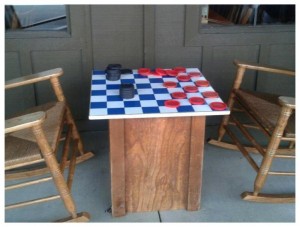
The Big Idea #1 Get started and get it over with
Ever wish you didn’t have to study? Get over it.
Self-scrutinizing my priorities and goals at a younger point in my life, and observing how they have shifted or remained steadfast, was at times unsettling. What things provided me with crossroads to keep moving, learning, and growing? There is actually a term for this: it’s called the Serial Position Curve.
While serial position curves aren’t necessarily one of the big ideas that I will take away from my life’s journey thus far, it is worth mentioning. Basically, because it provided a bit of an ‘intersection’; and I began to look for other intersections to stay on course. Each of us, throughout our lifetimes, will probably tend to have higher recollection rates for things we have done or accomplished near the beginning and the end of an event. Often, we have diminished or lessened recall for events that occurred in the middle of an event.

Get started and get it over with already. That was the Big Idea #1
Schema anyone? Schema, an old term that has been around for a long time. A plan or an outline.
We all go through stages where collections or interconnected bits of knowledge are gathered and stored. As the renown Theorist Jean Piaget first presented, “schema” as the term in which to describe both a category of knowledge and process in which we acquire knowledge. Our long-term memory is comprised of bodies of knowledge, or better known as Schemas. These Schemas help to filter our experiences and our reaction to those experiences.
When things aren’t within the realm of what we understand them to be
Often we want to believe something is factual, even before we have all the facts. There are times when we just do not have all the information that we need in order to make rational decisions. Our judgment in dealing with situations can cause us to respond in a contradictory manner. We react to emotions – we jump the gun. Learning the facts surrounding a situation isn’t always easy. But once we allow new information to be applied toward our existing schemas, then we can fine-tune our own understanding. The concept of building schema is new – but it’s not new. Depends on if you are learning something for the first time.
I have refused to deal with a few issues in my personal life over the years. As you get older you don’t get the luxury of refusal anymore. I’ve learned to allow new information to be applied, which can be rough, and sometimes mentally painful. But in the end, it will make me a better person. Like everyone else I still struggle to accept things I can’t change.

On the other hand, It’s not always new knowledge for me, because I always knew it was there – I just needed the right situation to present itself for me to break through my own resolve, which in the past was to go into a type of avoidance mode (dare I say activists?).
- No longer can I go into avoidance mode anymore
- There is no taking back or forgetting what I’ve learned
- I can only learn from new knowledge
Schema: The impact this will have on me as an educator (Basic 101 training)
A schema, which is similar to Scripts, helps us identify things we are familiar with (realms). You have to learn to grow your own Schema. As an educator, knowing where and when to apply a process that will help with learning is essential. Learners have to build upon those stereotypical memory blocks that make learning familiar. This in turn, will help them develop the ability to comprehend and respond to similar situations they may encounter.
Educators need to be able to develop a process where they can track where their students are at any given time, and help them stay motivated and equally engaged in learning. If they are failing, you need to know what process to use to get them back on track. You don’t want them to slip into avoidance mode – which we all do so well. If they are succeeding, you also need to know what tools or schemas are helping them advance.
The last thing an educator wants to be is a vehicle that takes students, workers, or anyone off the course to spin their own ego. Nor do they want to allow a disruptor to enter the room with off-task questions that pull the instructor into la-la land. Your goal? Stay on task.




